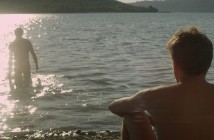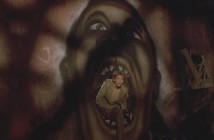A good week for documentaries and foreign cinema brings a broad mixture of genres for all tastes, everything from horror to romance, comedy to drama contained herewith. It’s also a week particularly friendly to old Oscar, counting a grand total of three Best Picture nominees and a handful of other wins and nominations. With titles ranging from 1940 to 2012, it’s nice to see such a wide selection added to our virtual shelves; I’m sure you’ll find something to suit you whatever mood you find yourself in.
Watch it here
Bearing many similarities in setup to director Greg Mottola’s prior film Superbad, Adventureland soon distinguishes itself as a movie with a good deal more heart, its young adult sex antics never the focus of the story but rather a means to home in on the awkward fledgling relationship of protagonist James Brennan, a recent college graduate who takes a job at the titular theme park in order to fund grad school the next year. Jesse Eisenberg works wonders with material that clumsily veers from gross-out comedy to more dramatic elements, tying down a movie that might have lost itself without so reliably involving a lead. Kristen Stewart is perfectly good as love interest Em, while Superbad alumnus Bill Hader mostly rehashes his role from that film (tiresome for me, but I’ll concede I’m mostly alone in that view). Losing sight of its aims occasionally in search of a silly gag, Adventureland is a mostly successful character-based comedy, a step-up for Mottola. WORTH WATCHING.
Watch it here
An engrossing watch that peels back the layers of urban mythology to reveal the horrifying realities beneath, Barbara Brancaccio and Joshua Zeman’s serial killer documentary explores the titular Staten Island bogeyman’s real-world equivalent. The disappearance of five (mostly mentally handicapped) children from the New York borough in the 1970s eventually led to the capture and conviction of one Andre Rand, a former worker in the island’s horrendously mismanaged mental institution. Incorporating interviews with bereaved relatives still clueless as to their children’s whereabouts, an eerie sensibility that adds to the mystery, and some extremely distressing exposé footage from said institute, Cropsey is an intimately fascinating watch, by turns intriguing and genuinely creepy. Brancaccio and Zeman’s portrait of Rand’s role in the disappearances and his own life during the period never feels quite full in its scope, offering at times more questions than answers, but it’s a strange, disturbing mystery more than worthy of the coverage they bring to it. RECOMMENDED.
Watch it here
France’s submission for the 2012 Best Foreign Language Oscar is an elegiac piece, centred on the fated romance of appropriately named young lovers Roméo and Juliette. Locking eyes across a nightclub dance floor, their whirlwind relationship rapidly spawns a son, Adam, whose lacking development at the age of eighteen months brings a cause for concern. Diagnosed with a rare but treatable form of brain cancer, Adam’s healthcare issues overhaul the pair’s life, effectively alienating them from friends and family and driving them to the brink of financial collapse. With so much doom and gloom about, it’s a wonder that Declaration of War manages to be quite so cheerful at times, never really residing in the shadows and wallowing in the darkness of the world it looks at. An efficiently emotional human drama, if one a little lacking in the real anger one might expect, it gets the best from leads Valérie Donzelli and Jérémie Elkaïm. RECOMMENDED.
Watch it here
Deservedly becoming the first—and to this day only—foreign language performer to win a Best Actor Oscar, Roberto Benigni’s performance in Life Is Beautiful brought a strange but unspeakably effective comedy to the screen’s representation of the Holocaust. Starting out as a silly slapstick comedy with shades of drama and romance, the Benigni-scripted and directed film drastically changes tone in its second half as his Jewish Italian character Guido and his family are shipped to a concentration camp and subjected to the inhumanity of the Nazis. Guido’s maintenance of a brave face to convince his four year-old son that the entire ordeal is all a big game is one of the most affectingly selfless acts in film history, and it’s that kind of heart-warming brightness in the darkest of situations with which Benigni proves the accuracy of his title. As quick to inspire tears as it is laughs, Life is Beautiful is a wonderfully inspirational work of cinematic art. HIGHLY RECOMMENDED.
Watch it here
A Best Picture nominee all the way back in 1941, this adaptation of Thornton Wilder’s Pulitzer Prize winning play boasts an early role for a spectacularly handsome William Holden. Playing a young man engaged to wed for no better reason than it being what’s expected of him, Holden grounds a rather ethereal and quite ahead of its time indictment of prototypical suburban American society. Certain aspects of the play translate to screen with less success than others, resulting in a predominantly stagey feeling that does the sincerity of the ideas a minor disservice. Even so, it’s an affecting and effective social analysis with two very fine performances from Holden and his bride-to-be Martha Scott, albeit one with a sorely unimpressive ending (written specially for the screen). While certainly not a flaw of the film itself, the quality of the stream leaves a lot to be desired in auditory terms, though not so much so that the experience will be spoiled. RECOMMENDED.
Watch it here
Kicking off with your run of the mill teenage slasher fodder for characters, Playback seems set to be a wholly dull horror affair until it begins to flash frames from, of all things, Roundhay Garden Scene. It never stops being a badly-made generic movie, but its baffling insertion of the oldest surviving motion picture is an odd enough move to hold the attention. It comes to pass that one of the characters may or may not be a descendant of pioneering filmmaker Louis Le Prince, who the film claims (apparently with no basis in fact) believed cinema could be used to capture its subjects’ souls. Mixed in with a heavy focus on digital technology and the modern world, Playback suddenly finds itself with some potential for purpose, which it rapidly squanders with a seemingly incessant sprawl of awful subplots. Made without much skill, particularly in the casting department, this is a terrible mess of a film with ideas far bigger than it can hope to contain. AVOID IT.
Watch it here
An author known for following his characters through a vast portion of their lives in rather weighty tomes, John Irving’s work is hardly the most suited to two hour film adaptations. Unlike previous screen outings, Irving himself assumes the role of screenwriter here, winning an Academy Award in the process. He certainly does a finer job of trimming down his novel than those behind previous adaptations, amalgamating characters and plot strands in such a way that, though it may upset devotees of the book, makes the story more viable at feature length. The material is as well suited to director Lasse Hallström as it is to Michael Caine (recipient of the film’s second Oscar), who plays ether-addled orphanage director Wilbur Larch. Tobey Maguire turns in some of his finest work as Larch’s protégé, the “unadoptable” Homer Wells. Doing a great book as much justice as possible on-screen, The Cider House Rules is a damn strong work in its own right. RECOMMENDED.
Watch it here
Never before was I so excited for a film as when it was announced that Bruce Robinson—mastermind of Withnail & I, for my money the greatest comedy film ever made—would helm an adaptation of Hunter S. Thompson’s early (though only relatively recently published) novel The Rum Diary. Additionally boasting Johnny Depp’s second outing as Thompson (here disguised as “Paul Kemp”) after a pitch-perfect turn in Terry Gilliam’s otherwise dissatisfying Fear and Loathing in Las Vegas, it seemed this adaptation had everything going for it. Alas, despite being the ideal person to tackle a story of substance abuse with the hectic mania of Thompson’s writing, Robinson seems in almost 20 years away from the camera to have completely lost his touch, producing a work of staggering disappointment. It’s not that The Rum Diary is a bad film—it has its moments—it’s just a sad shame the fusion of two brilliantly insane artists could produce something quite so stilted. SO-SO.
Watch it here
The common problem with anthology films is a lack of balance: the better episodes remain in the mind during the less interesting, serving only to make them seem even worse by comparison. This, however, is never an issue in David Wain’s The Ten: they’re all equally awful. A collection of shorts with some shared characters that update the ten commandments to the modern day, it’s a comedy that fails to muster even the hint of a single laugh, a unanimously ghastly procession of heinous story ideas made even worse by the pitifully pedestrian efforts of a cast that actually counts among itself some decent talent. Paul Rudd is the guide to the segments, forced between each to utter yet more awful lines to usher in the next. To watch the film is to sit in utter desperation awaiting the moment when finally some good will come along, which of course it never does. Insufferable dreck, to be avoided at all costs. UNWATCHABLE.
Watch it here
That here in the 21st century gay marriage is an issue only now coming to the forefront of public debate seems ludicrous enough in itself; that there are “straight camps” out there dedicated to “curing” homosexuality is downright disgusting. Morgan Jon Fox centres his documentary on the story of Zach Stark, who at 16 came out to his parents only to be informed that he would be sent to a fundamentalist Christian facility that would heal him of his unwholesome desires. Inspiring not just disbelief and rage at this issue, but also an uplifting sense of hope at the huge backlash that arose as a result of Zach’s blog postings, This Is What Love in Action Looks Like interviews former staff and clients of such camps to reveal the deeply unsettling stories of people made to feel as though they were somehow unnatural. Rightly highlighting such idiotic intolerance for the baseless hatred it is, this is an important piece of documentary filmmaking. RECOMMENDED.
Watch it here
Armed though it is with an immediately gripping premise, Train to Nowhere fails to make much of a shocking story, instead becoming a stilted and particularly televisual crime documentary that struggles to fill its running time. The discovery of 11 decomposed bodies in a Texas railcar was the starting point of a state-wide mystery into the trafficking of undocumented immigrants, leading eventually to the arrest of several prominent players in that hugely lucrative trade. At its best when speaking to the emotionally-charged brother of one of the victims, who were left locked in the train in the sweltering heat when nobody came to release them, the film offers a mostly very dry and uninteresting look at the case, covering the same ground many more times than necessary. It’s a shame that no more could be made of so tragic a fate: those 11 people deserved to have their story told, but not in so dull a manner. SO-SO.




